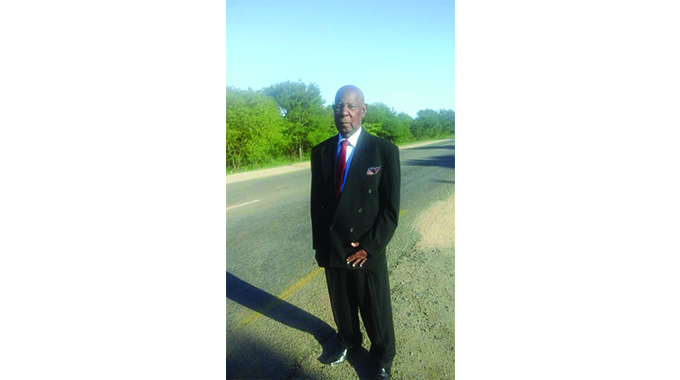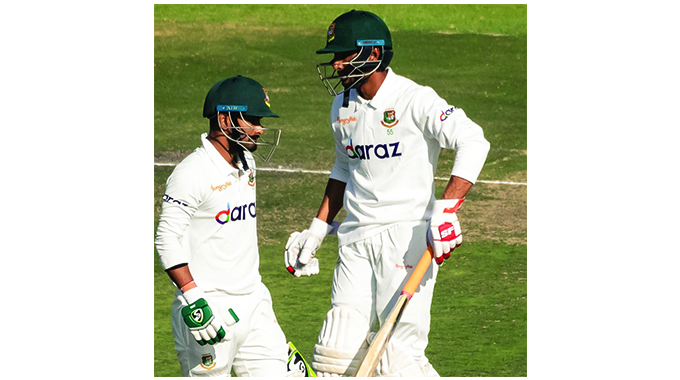Tributes pour in for Cde Abraham Nkiwane

Mashudu Netsianda, Senior Reporter
MEMBERS of the Zimbabwe People’s Revolutionary Army (Zpra) High Command and senior Zanu-PF officials yesterday hailed veteran nationalist Cde Abraham Dumezweni Nkiwane for the big role he played during the liberation struggle.
Cde Nkiwane (93) succumbed to prostate cancer at the United Bulawayo Hospitals (UBH) where he was admitted.
He was among the first cadres to smuggle weapons into the then Southern Rhodesia in 1962.
Cde Nkiwane is one of Zpra’s first commanders who operated under the Special Affairs and Training unit.
Zipra adjutant-general and chief of military engineering, Cde Jeffery Ndlovu said Cde Nkiwane was instrumental in facilitating the movement of the members of the High Command to train in countries such as Russia and Vietnam.
“I first met Cde Nkiwane in 1970 in Lusaka, Zambia when I was going for military training in Morogoro in Tanzania and he was no longer Chief of Personnel and Training following the Zapu internal crisis of 1971 emanating from the formation of Frolizi,” he said.
“However, when I returned from Tanzania in 1972, Cde Nkiwane was still active in the party and he would draft project proposals. I remember when Dr Joshua Nkomo arrived in Lusaka, Cde Nkiwane is the one who designed and constructed a shelter for him to protect him from the military attacks by Rhodesian Forces.”
Cde Ndlovu said it was through the late liberation stalwart’s efforts that Zpra commanders such as Alfred Nikita Mangena and Lookout Masuku including members of the High Command travelled overseas for military training.
Zpra High Command’s Chief of Logistics Retired Colonel Thomas Ngwenya said Cde Nkiwane played a critical role in the liberation of the country.
“I first met Cde Nkiwane in the early 1960s in Lusaka, Zambia and we would on numerous occasions travel together to Dar es Salaam on Zapu missions,” he said.
“By virtue of having worked with the late former Zambian President Kenneth Kaunda’s UNIP, he equally played a role in the independence of that country. Surely, Cde Nkiwane deserves to be declared a national hero.”
Zanu-PF spokesperson Cde Simon Khaya-Moyo described Cde Nkiwane as an epitome of humanity and a true patriot.
“The sun has set during the day. Cde Nkiwane never spoke of his heroic deeds and he was action itself and was indeed an epitome of humanity, a true son of the soil and a man of the people,” he said.
“He was very humble and a true patriot. He has joined his indomitable leaders like Dr Kenneth Kaunda (KK), Umdala Dr Joshua Nkomo to mention but a few. May his great soul anchor and rest in eternal peace. He deserves the honour. Lala ngoxolo Mdala Nkie.”
Zanu-PF Secretary for Administration, Dr Obert Mpofu, said the ruling partly learnt with shock and grief of the death of Cde Nkiwane.
“The tragic elevation to glory of former Zpra Commander Abraham Dumezweni Nkiwane once again reminds us that African liberation memory is increasingly becoming vulnerable as every day goes by,” he said.
“With many of his kind slowly departing the earth, the nation and the entire pan-African fraternity is being robbed of its historical sense of being. While this sends shock and sadness, our relief remains deeply rooted in the prominent liberation legacy, which will be indelibly immortalised by the independence of our nation.”
Dr Mpofu said as the nation celebrates Cde Nkiwane’s life, his departed spirit will continue to guide the fight against colonialism in all its manifestations.
He said Cde Nkiwane was a pathfinder to the forever cherished objectives of Zimbabwe’s anti-colonial struggle.
“His ambition for Zimbabwe’s independence motivated many of my time and others who went ahead of us to join the Zimbabwe People’s Revolutionary Army. By 1961 Cde Nkiwane was privileged to be under the direct ideological tutelage of the late pan-Africanist, President of the United National Independence Party (UNIP) and founding father of Zambia, the late Dr Kenneth Kaunda,” he said.
“He served UNIP right up to his early involvement in the operationalisation of the Zimbabwe African People’s Union (ZAPU)’s activities when it opened its offices in Lusaka. It will be recalled that as early as 1962, Cde Nkiwane alongside the late Misheck Velaphi Ncube and Kennias Mlalazi initiated the entry of the first set of arms, which pioneered the ZPRA rooted revolt against the settler regime.”
Dr Mpofu said Cde Nkiwane’s inaugural pledge to the making of the country’s independence together with others produced the unequivocal triumph of the nationalist movement against the illegitimate Rhodesian state.
“The present success of the liberation movement in Zimbabwe and the region is indebted to individuals like Cde Nkiwane and many pan-African minded cadres of his time. In 1965 ‘Bra Nkie’ as we affectionately called him, served as the Chief of Personnel and Training in the Zpra Special Affairs High Command.”
Dr Mpofu said when he joined the struggle in 1967, Cde Nkiwane served Zpra alongside decorated High Command members such as Retired Colonel Tshinga Dube, late Dr Dumiso Dabengwa, Ackim Ndlovu, Robson Manyika, Gibson Mayisa, Arnold Gombakomba, Phelekezela Report Mphoko and Ambrose Mutinhiri.
He said Cde Nkiwane was a symbol of ultimate sacrifice and a foot soldier of the decolonisation project.
“From time to time, the late liberation stalwart was always in transit between Zambia, Angola, Tanzania and other nations, which served as sanctuaries for Zpra and ZAPU’s business. As he rests, the nation must be reminded that Cde Nkiwane remains a template of true commitment to the nation,” he said.
Cde Nkiwane was born on January 6, 1928 in Ntabazinduna in Matabeleland North and attended the Presbyterian Church’s David Livingstone Primary School before proceeding to Thekwane Mission after which he taught at Tjehanga School from which he was expelled along with others for their demand for justice in the manner the Methodist Church was running schools.
In 1949 he was employed by the Bulawayo Municipality working in the African Department under the directorship of Dr Hugh Ashton.
In 1954 when Cde Nkiwane was reading towards the Bachelor of Commerce degree, he left for Northern Rhodesia (now Zambia) at the time of the Federation of Rhodesia and Nyasaland which had been inaugurated in 1953.
Initially, he lived in Livingstone where he worked as stock controller in a company known as Rhodesia Mercantile Holdings. He worked for that company until 1960.
In 1961 Cde Nkiwane joined UNIP. Soon he began to work full time for Zapu and subsequently moved to Lusaka. Not so long after that Zapu leader Dr Joshua Mqabuko Nkomo visited Zambia specifically to solicit political support from Dr Kaunda.
Cde Nkiwane is survived by wife, Ntombizodwa and three children, two sons and a daughter.
Mourners are gathered at Joyful Farm in Umguza District.-@mashnets










Comments